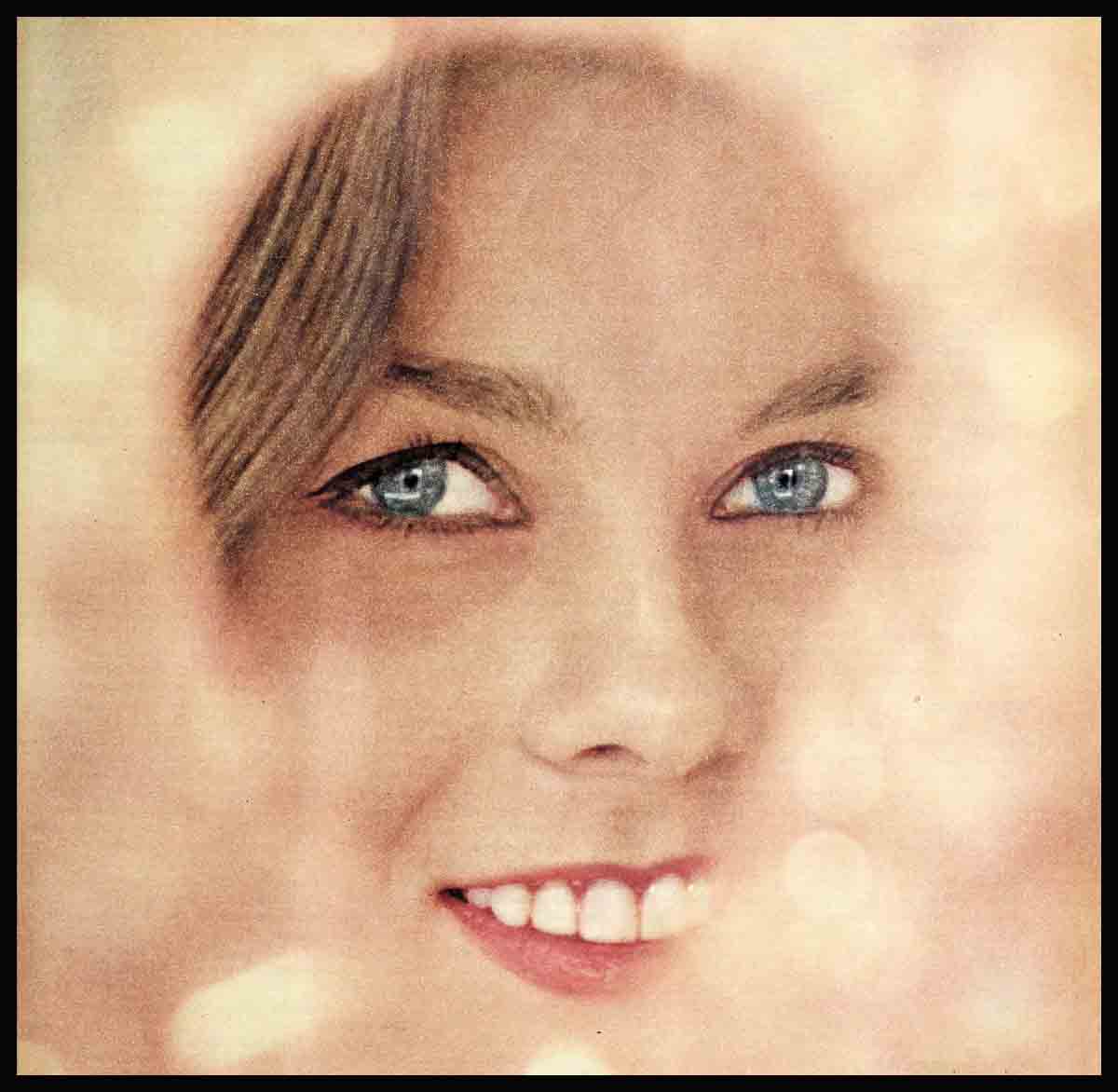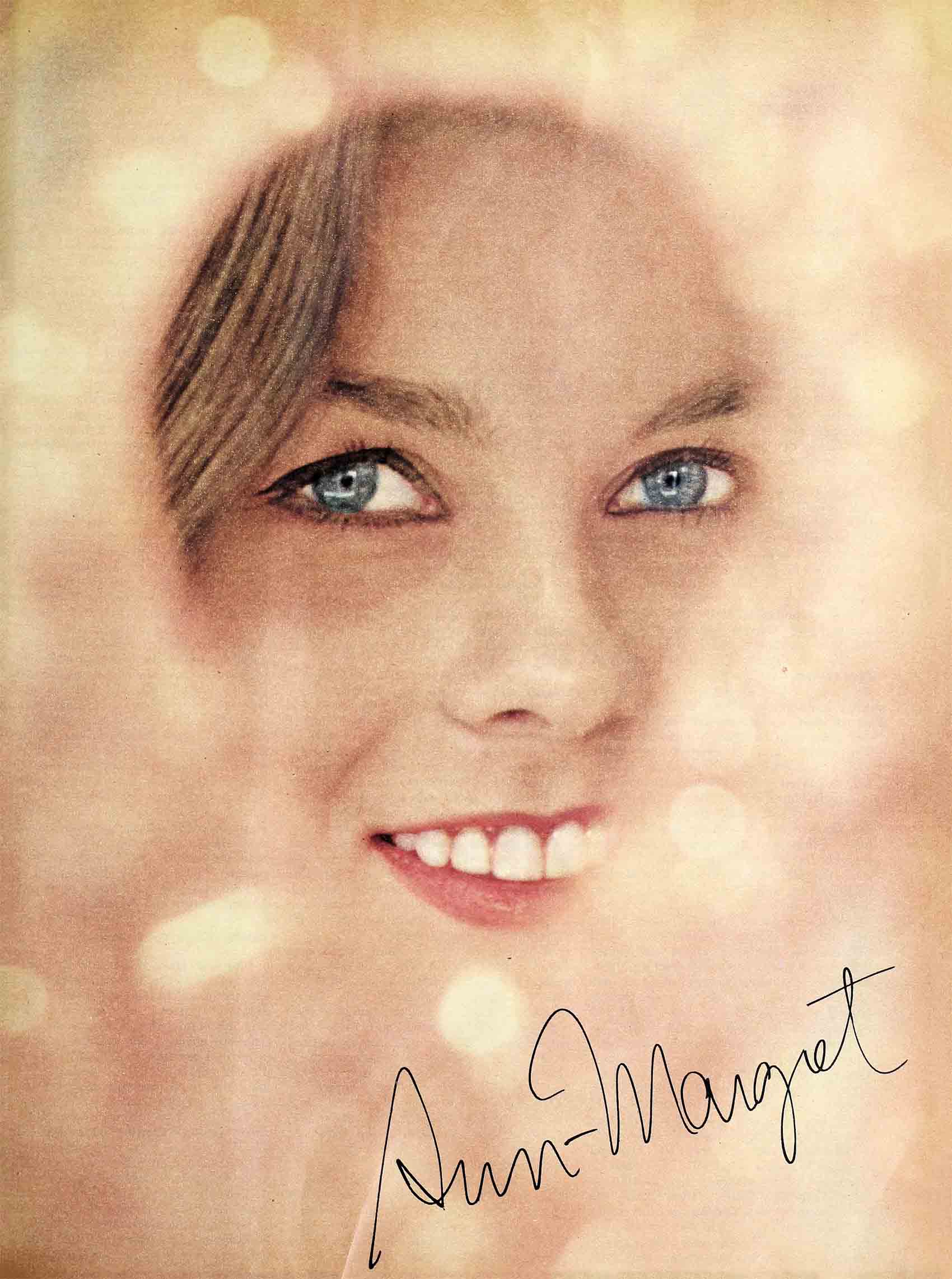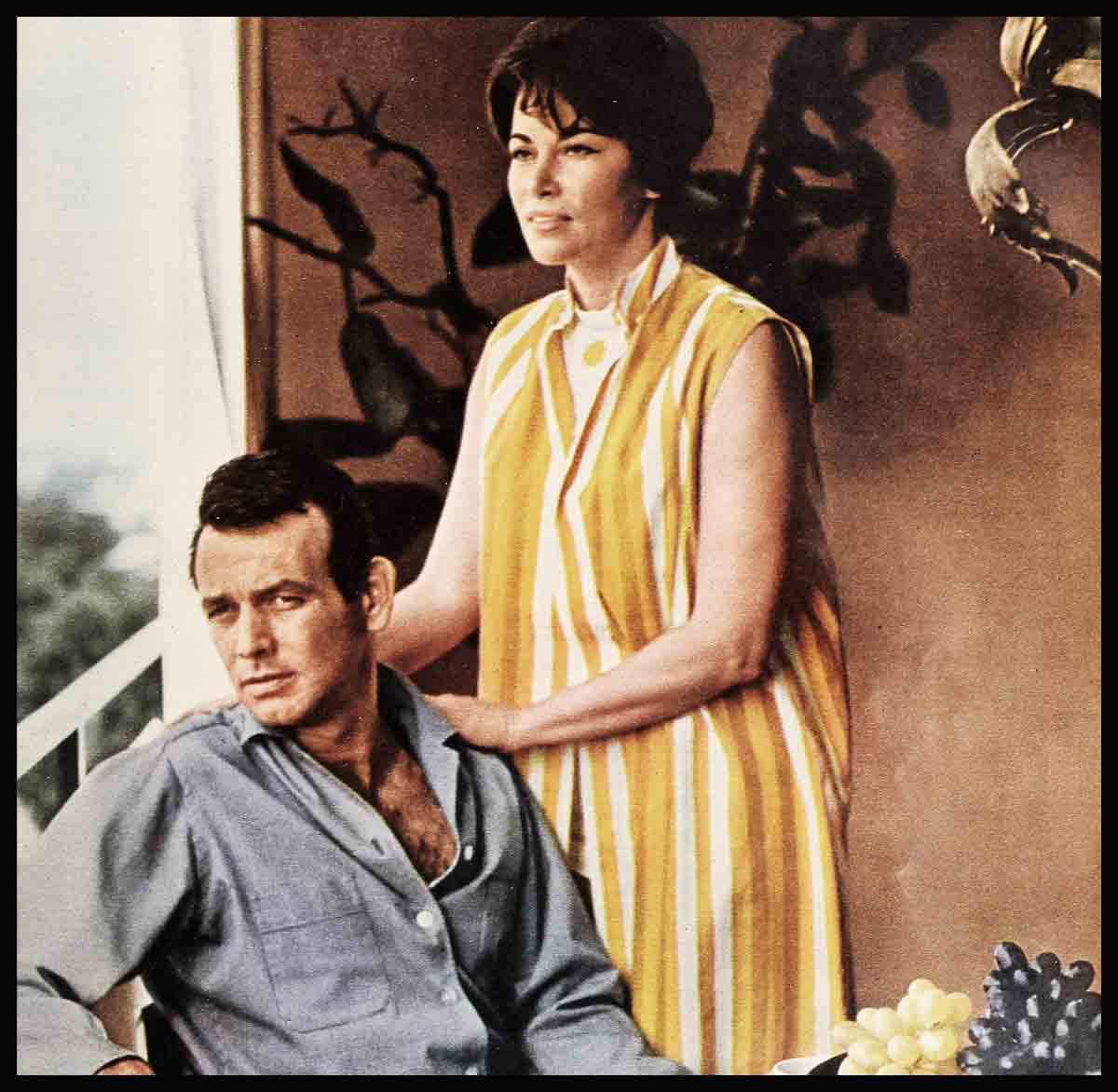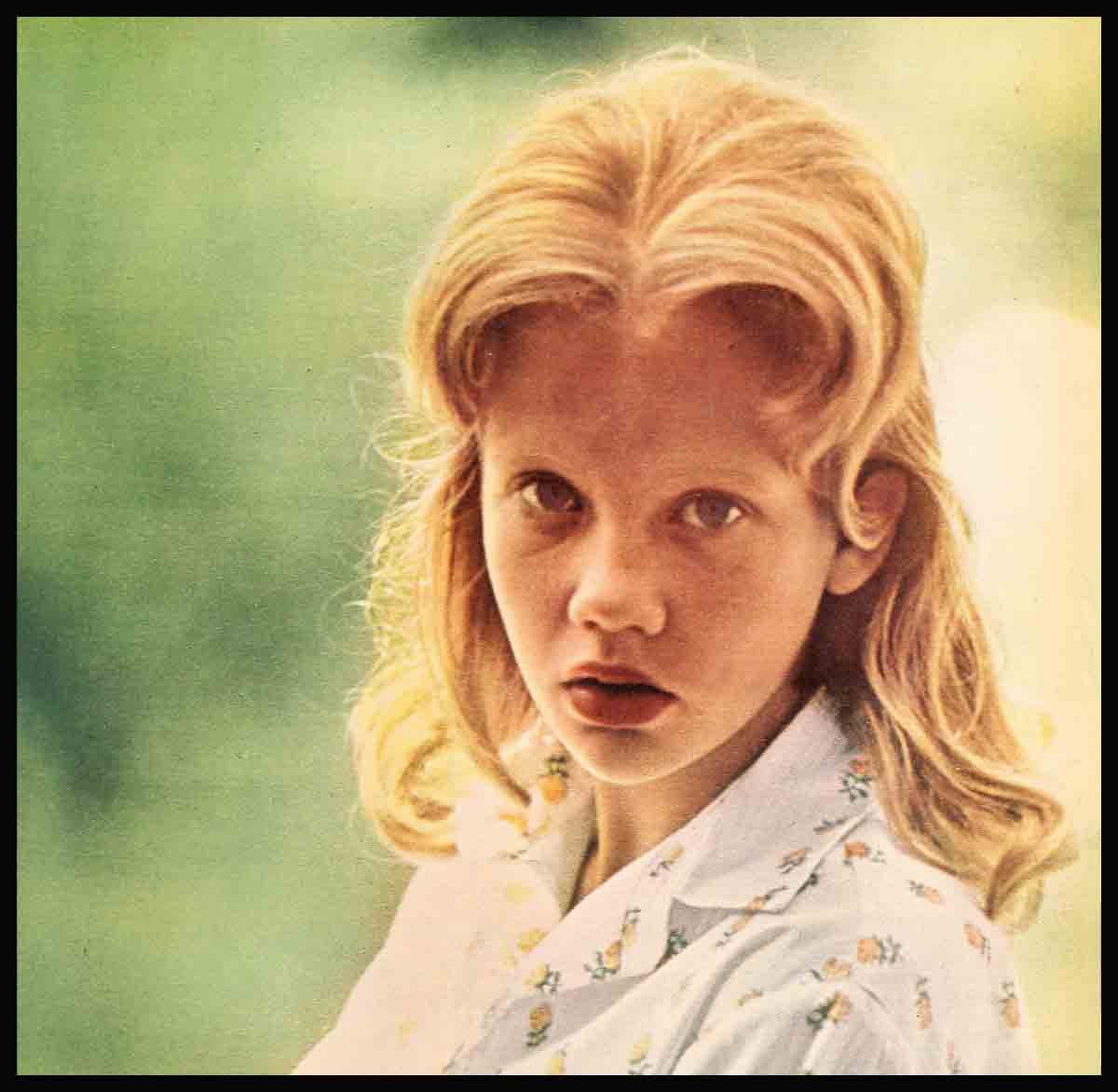
“You Can’t Play Hide And Seek With Love . . . I Know . . . I Tried”—Ann-Margret Olsson
Ann-Margret Olson sat in the deep leather chair of the studio offices with her head down and her long shiny hair hanging like a delicate curtain that sought to hide her anguish. When she finally looked up, I knew that down inside she was crying and trying not to show it. But it had happened and she was facing it. For a twenty-year-old girl it was not easy. Because of what had happened, life would never be the same.
“But I’m not sure,” she said at last, “that I want it to be as it was before. I think the change began shortly after Burt (Sugarman) and I announced our engagement. Here I was in the midst of what should have been the most beautiful and exciting phase of my life, and yet . . .” she hesitated, “I kept asking myself, is this what every girl goes through when she becomes engaged? Does every girl feel racked with grief? What kind of a love is this? What is happening to me? Did I love Burt so much it hurt?” She stared at the floor, shook her head slowly. “After a while,” she continued, “I couldn’t stand it.”
Ann-Margret didn’t have to tell me of the hell she had been through. The dark rings under her pretty eyes were enough evidence. I kept thinking how wrong it was to see such an unhappy, haunted expression on that beautiful face. “It got to the point,” she said softly, “where I realized that none of it, not one instant of it. made sense. I imagined it was all my fault—I’d done something wrong. Somewhere, perhaps, I had failed because I didn’t know how to be a woman about love.”
She raised her head and looked at me. “I love people,” she said. “I don’t want to be unworthy of being a human being. Since I was a little girl, life excited me, I wanted to be part of it. I never forgot that if I wanted happiness from life I was going to have to give. That’s the way I’ve tried to live. In return I just hoped I’d never be lonely. Honest to God, that was all I wanted.”
She was fighting to keep back the tears.
“And then all of a sudden, when I should have been delirious with happiness, I discovered that the loneliness I had always dreaded was in me. Somehow, when my heart wasn’t looking, it came in.
“When I started dating Burt, it was wonderful,” she said. “Then came that moment when I knew. It’s difficult to explain. But I don’t imagine there’s a girl over eighteen who hasn’t experienced that instant. That sweet and dizzy part of a second when you know. The feeling sweeps over you, an impossible mixture of relief and new longing rushes through your mind, your heart and your body.
“I was in love. I was swimming in it. And saying to myself, ‘How odd, Ann-Margret, that you’ve never been in love before.’ From that moment, Burt was all of my life.
“I said to myself a hundred times, I don’t care how many millions of people have fallen in love since time began, there has never been a love like ours.
“The night Burt proposed and I accepted his ring—I felt as though I was half of a miracle. I’m glad in a way, that I squeezed all I could out of that moment. Because it didn’t last twenty-four hours.
Her parents disapproved
“It stopped the moment I told my parents that I was going to marry Burt.
“You must understand,” she said, “that my parents did not forbid me to marry Burt. They told me simply that they didn’t approve of the marriage. They thought we were both too young for marriage. I knew, of course, that they believed this was for my good and Burt’s.
“Then, on top of all this, something else happened. The studio reminded me that I was committed to a three-week personal appearance tour around the country with ‘State Fair.’ One or two nights in a city. It was to begin exactly one week after the announcement of my engagement. Now, with everything else, I was going to have to leave Burt at a time when we needed each other desperately.”
There is no doubt Ann-Margret is a girl with a heavy schedule. When I saw her, the immediate future held trips to New York, Chicago, Texas; back to Hollywood; then Sweden; an LP album and a single to record; a night-club act with George Burns in Seattle, Tahoe and Vegas—and two more movies.
Ann-Margret didn’t bring it up, but there were other complications. The first was that Burt was so wildly in love that soon after they met, he wanted to marry her. But a more serious insistence began to grow. Burt is a businessman. With his father, Al Sugarman, he is half owner of one of the largest chains of used car lots in the country; a string of prosperous restaurants; dealings in real estate. Burt is what most girls would call a rich bachelor. And lie prefers to keep his private life out of the papers and magazines. With Ann-Margret, he was forced to bear the exposure. He didn’t like it and he told Ann-Margret he didn’t like it.
The second serious complication was Mr. Olson’s health. Late last year he suffered a mild stroke. He recovered, but he was warned by doctors to take it easy. He and Mrs. Olson moved to Hollywood.
“I decided it was about time my parents stopped working.” Ann-Margret said. “I was making enough money now to support them comfortably. I wanted to do it—I thanked God for making it so I could. Dad’s slight stroke was a reminder to a daughter that now was the time to be with my parents. I knew Dad would take it hard if I—”
In itself, the situation was enough for a twenty-year-old girl. Then to learn that her father did not approve of Burt or the marriage proved a threat to her hopes.
“What could I do—obey my father and lose Burt? Or go ahead and marry Burt and maybe lose—” She looked down and absently touched the third finger of her left hand. Where Burt’s ring had been.
It does not take much to imagine the ominous three-cornered cloud that had hovered over her head.
There was, however, an even more disconcerting fact that began to grow out of all proportion to its significance.
Twenty-three-year-old Burt Sugarman is always referred to as wealthy, personable, intelligent and a graduate of USC.
Wbat no one’s pointed out till now is that Burt is a divorced man.
There is no evidence to support the speculation, but it would seem that having failed to keep his first marriage intact. Sugarman did not appeal to Mr. Olson as a sure bet for his daughter’s happiness, a concern for which the father had the deepest regard. Those close to the family say that if Burt had not been divorced, Mr. Olson would have offered no resistance.
But even Ann-Margret’s friends and Burt’s friends seemed to have doubts.
“From the beginning,” Ann-Margret recalled, “people would see the ring on my finger and then they’d say, ‘Oh, you really are engaged, aren’t you?’
“Then they’d say, ‘But do you love Burt?’ ”
Her voice tightened as the knot of exasperation stuck in her throat.
“Did they think I would take the ring from Burt just to get the ring?” she asked. “That I would wear it on my finger, my engagement finger, and not love him?”
She was still trying to keep her tears from showing—and doing it so bravely!
“I loved Burt,” she continued. “He is the strongest man I have ever known. I have never, never been in love before. Perhaps that is what worried my parents. I think they were afraid a first love wasn’t deep enough to last. But Burt is kind, considerate, intelligent and quite the most wonderful man I’d ever met.”
One possible factor, which Ann-Margret denies—is that their religion emphatically could make a difference. Burt is Jewish, Ann-Margret is Lutheran, and an intensely religious girl, a girl who’s face lights up when she says “I love church! A girl alone in a big city ought to go to church—it gives you strength. You come out feeling so good, so strong.” Sometimes, away from home, she attends Presbyterian services, but she needs to feel at home in a church, and friends feel she would not be at home in Burt’s synagogue.
Another factor is her restlessness. She can’t bear to simply sit around for one evening, let alone a week, a month, a year. She loves to travel, to live in hotels, to pack and unpack and move. Marriage could mean giving this up. The world of finance—Burt’s world—usually attracts fairly conservative young men who do not pick up and go simply for the sake of going.
Yet this restless girl also loves the home she has made it possible for her parents to live in—the large apartment in Los Angeles. She enjoys the advantage of being an only, indulged child.

Little girl at home
She loves the huge room her mother has fixed up for her, with its little-girl clutter of dolls and stuffed animals. She sleeps in a big double bed, scatters her clothes around for her mother to (cheerfully) pick up. And she is generally her own boss. She spends at least part of her earnings as she likes.
A strange girl, Ann-Margret. In person she is quiet, sedate, reserved, with an air of intelligence. How is she transformed into the sexy, twisting performer she has become? “When I hear music,” she once told me, “I lose all my inhibitions.”
And when she performs? “Sometimes when a person has known me for a couple of months,” she told me, “and then goes with me to a club to see me perform, when I come back to the table after my act, he will stare and stare and stare—until he realizes lie’s staring and he stops.” I have a strong notion that Burt Sugarman, whom she also knew only for a couple of months, was one of those who stared, and stared. And Burt would have been expected to join in the dance, though not on stage. For Ann-Margret’s idea of a good time is a quiet dinner followed by hours and hours of twisting. Was Burt prepared for this? One suspects that Ann-Margret was not the only one who had second thoughts about the marriage.
Yes, Ann-Margret is in love with music and food and church and traveling and applause and dancing and acting. And none of these loves make the demands on her that marriage would.
But she still loves Burt.
“I was happy with Burt and I know he was happy with me.” she said. “I hoped to become his wife. I wanted that. I think ? I wanted it desperately.
“Some of my friends said that for an engaged girl I didn’t sound very happy. I guess I wasn’t, away from Burt. But what others saw as doubt was simply my way of taking love seriously. I wanted to understand myself as a woman in love. I wanted to know how to insure that love.
“And then, in less than two weeks, the whole world fell on top of me.”
Ann-Margret’s parents had to know: Did she plan to go against their wishes?
Burt had to know: Would the woman he loved become his wife or not?
“And what about the tour, baby?” the studio insisted. “We’ve got to know.”
“It took three days for me to decide,” Ann-Margret said. “Maybe they were three days wasted, because in the end I realized that in the beginning I knew exactly what I had to do.”
Early one warm California evening, by the quiet of a breeze-swept knoll that overlooked the sparkling city of Hollywood, Ann-Margret slipped a ring from her betrothal finger and told Burt that she could not marry him.
She kissed him gently and said, “Please take me home.”
Burt Sugarman is not yet sure why it happened. All he knows is that he lost the girl he loved.
“I don’t feel like a girl anymore,” Ann-Margret said. “I guess I’m finally a woman. I’ve given up the man I love.
“I love my work, I love my parents, I loved Burt. Maybe I just loved too much too hard.
“But at least I know how to fall in love,” she said. “You don’t do it blindly, you don’t play hide and seek. You consider the risk. You take a chance with your heart and your mind. You don’t for a moment imagine that because you’re in love you can’t be hurt. Instead you try to be ready to be a good loser. You’d better be. If you don’t and you’re a woman you’ll cry your insides out.”
She stood up.
“I haven’t told all this to anyone else,” she said. “I don’t think I could tell it again. I just hope I didn’t sound like—well, you know—the girl with the bruised heart. I’m not angry at life. I still love people. I can’t help myself on that. I don’t pity myself and don’t want others feeling sorry for me. I’ll get over it.”
She moved toward the door.
“But I’ll date Burt again. I still love him.”
She turned her face from me quickly and closed the door softly behind her.
—BY ALAN SOMERS
Ann-Margret’s in “Bye, Bye Birdie,” Col.
It is a quote. PHOTOPLAY MAGAZINE SEPTEMBER 1962





zoritoler imol
2 Ağustos 2023Would love to incessantly get updated great weblog!